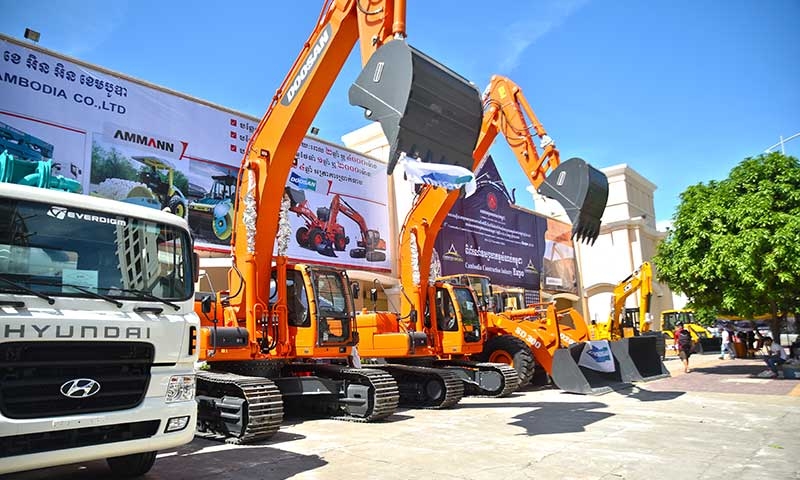Rising demand drives construction supply sector
Amid increased demand from the booming construction industry, construction material supply remains a big business in Cambodia.
Cambodia’s real estate market has experienced rapid growth in recent years. Growth is driven by strong construction activity, rapid industrialisation and urbanisation, the rising housing needs of a growing population living in the city, growth in business activities and a resultant increase in commercial development projects. This construction boom is being fuelled by every level of buyers. As a result, the demand for building materials has skyrocketed.
However, imported building materials and infrastructure challenges make transporting these materials logistically challenging.
Urbanisation remains one of the major factors driving the private and public sector to invest in commercial, residential, industrial and infrastructure projects. With growing real estate construction activities, Cambodia’s building materials sector cannot meet demand from domestic construction activities. “Basically, Cambodia has to import all types of construction materials from overseas,” said Chhoun Sun Heng from Phnom Penh City Center, the developer behind various projects in the Beoung Kak area. As a result, investment in domestic expansion is vital. The domestic production gap represents an exceptional business opportunity for companies currently operating in Cambodia. Locally-made materials can be consumed not only in the domestic market, but also exported to other countries.
In terms of supply, many local material suppliers, and a number of engineering agencies have become suppliers of international construction material brands. This has allowed them to monopolise the supply of certain brands that previously weren’t available in the Cambodian market. The suppliers of these international brands usually develop by authorising local Cambodian dealerships, or by opening a representative office. As the market matures, they can either move into a permanent subsidiary or establish a manufacturing facility in Cambodia.
Though Cambodia currently still relies on imports of construction materials, the private sector should boost production capacity in order to meet the high demand of building materials. In the last few years, imports of construction materials have grown due to strong demand. At the same time the prices of imported goods have declined. “Owners of large construction companies still import materials for their projects, while many smaller construction companies also import the materials,” Chan Mlop Sokha from Sokha Law Firm explained.
The rapid growth of the construction sector has led to increasing imports of materials from China, Thailand, Vietnam, Malaysia and Europe. Beside the structural building components, demand and competition is also high for interior finishing materials, for example tiles, and bathroom accessories such as douches, plastic doors, taps, tubs and wash basins. Some existing suppliers acknowledge that new Chinese players are competing on the basis of cheap pricing, undercutting suppliers and manufacturers from Thailand and Vietnam. But Chinese products generally have lower standards compare with those produced in developed countries. Products produced in developed countries are still superior in their technology, equipment and quality of products.
Furthermore, the growing consumer class in Cambodia is fuelling desire for higher standard products, particularly in the bathroom, kitchen and tile sectors. Products in increasingly high demand in Cambodia include decorative products, energy saving products, iron and steel fixture and fittings, lighting fixtures, pipes, roofing, tiles and flooring. Glass and plastic producers can also reap the benefits of growing demand from the construction sector.
Until now, Cambodia has had to look overseas to meet demand for certain building materials. The recent worldwide focus on a clean environment and the use of environmentally-friendly materials, there is also great potential in Cambodia for green building and construction materials. One of the challenges facing the construction materials industry is the large amount of pollution that production entails. Construction companies in Cambodia can go for greener, safer, more efficient materials, and more eco-friendly and value-added products. To achieve this, the industry should tackle problems such as outdated technology and environmental pollution. It can be said that due to outdated technology, factories cannot produce some high-quality materials for modern construction work.
Most of the demand for construction materials comes from the residential sector, followed by commercial, industrial, and infrastructure projects. Demand from infrastructure projects is still low. The recent growth in demand for cement reflects not only more homebuilding to serve the growing middle class in Cambodia, but also the growth in state- supported investments, tourism and infrastructure developments.
Building material suppliers are thus set to benefit from continued investment in the real estate and capacity growth. As a result, sales are increasing year-on-year due to the increasing demand from construction sites. However, residential sales have been declining in recent months causing some slowing in construction material sales. With the expected slow-down in the residential segment, this may hinder the overall growth of the construction material markets in the coming years.
As a result, it is likely that the long term key driver in Cambodia’s building material industry will be government infrastructure investments. We can also expect higher government spending on infrastructure, and this will also likely galvanise private investment and spark a rise in construction materials demand. That is good news for the construction sector and suppliers of building materials as urbanisation in Cambodia still has a long way to go. After all, the Cambodian convstruction materials market remains underpenetrated. Cambodians living in less-developed provinces and cities outside Phnom Penh will seek to emulate the consumer lifestyles of residents living in Phnom Penh.
In summary, the market for construction materials is thriving. Construction momentum has been strong in Cambodia and remains an attractive investment destination for building-related industries and the outlook remains bright. Newer products will enter the market will continue to develop and become more sophisticated. Construction materials such as ceramic tiles will be the backbone of strong demand going forward and increases in production are unlikely to pose a threat to sales and profit margins in the market
- Video Advertisement -



 ខ្មែរ
ខ្មែរ







